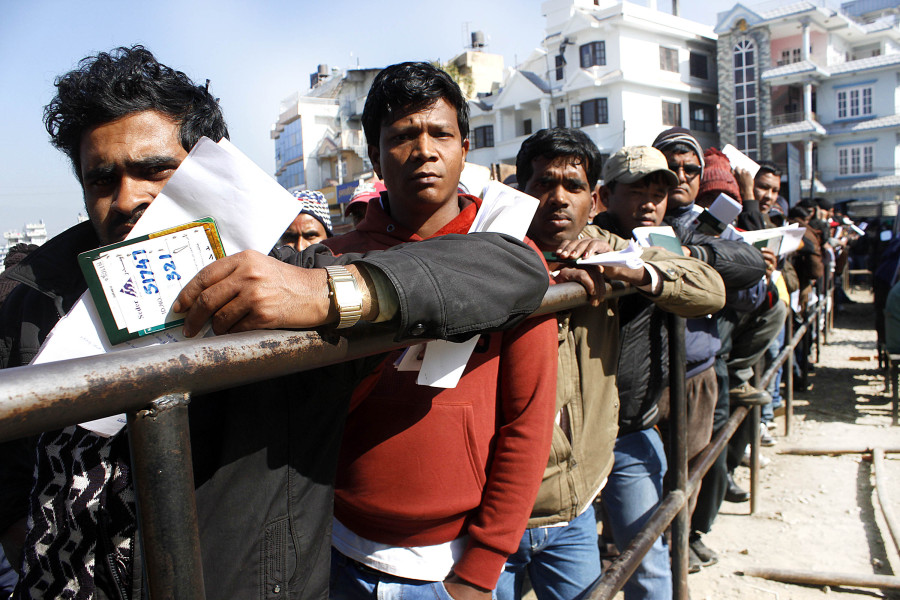Columns
BLAs in domestic work
Bilateral Labour Agreement must penalise exploiters of Nepali domestic workers abroad.
Ayushman Bhagat
After a long wait, the Government of Nepal is planning to sign a Bilateral Labour Agreement (BLA) on domestic work with the United Arab Emirates (UAE). This landmark agreement will open legal employment pathways for thousands of Nepali domestic workers.
Whilst this is a welcome step, a question remains: Is the BLA a robust agreement to ensure labour rights and reduce the vulnerability of Nepali domestic workers to exploitation? The answer is ‘no’. Research suggests BLAs are opaque diplomatic toothless agreements filled with vague and unenforceable promises that benefit host countries.
However, if the document’s language is strong, its nature is legally binding and effective enforcement mechanisms are put in place, it may significantly reduce the vulnerability of Nepali domestic workers to exploitation abroad.
Toothless tool of migration governance
BLAs are signed to regulate the flow of migrant workers, setting labour migration terms like eligibility criteria for becoming a migrant worker, obligations of both the sending and receiving countries and mechanisms for dispute resolution.
While migrant-sending countries use BLAs to expand labour markets, secure remittance flows and guarantee labour rights for their citizens, migrant-hosting countries prefer BLAs because they require little or no commitment to abolish exploitative labour policies, practices, or exclusionary immigration laws.
Although migrant-sending countries attempt to advance the rights of their citizens through BLAs, their weak negotiating power often allows host countries to reject their demands. These countries are left with weakly worded BLAs, with vague commitments and unenforceable clauses. These clauses effectively absolve host governments, recruitment agencies and employers of accountability towards migrant workers, thereby normalising exploitation.
BLAs and domestic work
Since the late 1990s, the government of Nepal has permitted domestic work emigration. However, several media outlets and migration and anti-trafficking actors have often sensationalised cases of extreme labour exploitation of Nepali citizens from the beginning, often overshadowing positive migration experiences.
In response, migration bans have been the Government of Nepal’s major tool for protecting Nepali migrant domestic workers since the outset, culminating in a total ban in 2017 following a parliamentary committee’s recommendation. In 2020, the government proposed a set of preconditions for lifting the ban, with BLA in domestic work remaining the key requirement.
The government’s migration ban on a pilot basis is helpful, as the damage caused by such bans on domestic work is very high. While providing the government with immunity, BLAs remain ineffective in resolving migrant Nepali domestic exploitation. They lack juridical power and provisions to enforce clauses fully or impose severe penalties for non-compliance.
Despite being ineffective in safeguarding the rights of migrant domestic workers, these ‘toothless’ BLAs remain the only practical instrument available for the government. Hence, I offer some recommendations for making the host countries accountable through BLAs.
Making BLA bite
The government of Nepal must include migrant domestic workers in all stages of formulating BLAs—drafting, consultation, implementation, monitoring and assessment—reflecting the lived realities of Nepali domestic workers, not diplomatic commitments that serve host countries.
Next, BLAs must include clauses ensuring Nepali domestic workers’ right to change employers without penalties or loss of legal status. They should prohibit employers and recruitment agencies from withholding or confiscating workers’ passports and establish concrete enforcement mechanisms and clear channels for reporting violations, ensuring legal action via fast-track courts.
Further, BLAs should mandate the National Human Rights Commission (NHRC) Nepal to coordinate with human rights NGOs (or NHRIs) in host countries to investigate cases of labour exploitation, abuse and death. BLA’s technical committee (or Joint Committee) must include the NHRC, women in migration networks (such as Manjari), returnee migrant domestic workers, trade unions and community organisations, both from Nepal and the host country. There should be mandatory committee meetings.
The technical committee can be effective if BLAs are strongly worded and legally binding under both domestic laws and international labour standards. These agreements currently promote labour dispute resolution via an “amicable” process, leaving serious issues such as rape, physical violence, murder, wage theft, or excessive overtime to be resolved in a non-confrontational manner. Thus, labour disputes are prevented from entering formal legal channels. BLAs should instead explicitly state that serious labour disputes should be resolved through judicial processes.
BLAs should therefore be tailored to the legal infrastructure of the host country. For example, in the UAE, domestic work-related disputes must be directed to the Tabdeer centres, allowing legal arbitration in domestic work disputes, thereby increasing the chances of fair outcomes.
Host countries’ judicial systems often favour their states and employers’ interests. In response, BLAs must demand that host countries register employers with the Nepali embassy/consulates before allowing them to recruit Nepali domestic workers. This will enable periodic random household audits and enforce compliance with arbitration rulings, threatening to blacklist non-compliant employers. BLAs should outline the legal repercussions of non-compliance by employers, recruitment agencies, and the host state to ensure the full protection of workers.
BLAs should also include a clause to guarantee the rights of trafficking survivors. Host countries usually have a broad understanding of trafficking, unlike in Nepal, where trafficking is conflated with sex work. These countries could face reputational damage and potential international sanctions (from the UN and the US) for failing to provide safe housing, legal aid, medical support, employment opportunities, a temporary visa or even citizenship to the survivors.
BLAs should then require host countries to meet international standards for protecting migrant domestic workers, including clauses that allow escalation of disputes beyond national arbitration. If arbitration decisions favour employers, as often occurs, the government of Nepal should reserve the power to invoke the International Labour Organisation Article 26 and escalate cases at the International Court of Justice (ICJ) via its technical committees.
Additionally, the government should strengthen its on-the-ground support, including mandating a domestic work attaché (with desk space, hotlines and shelters) at every embassy or consulate in the host country. This would establish key points of contact for both migrant domestic workers and authorities in host countries.
Further, BLAs should expand existing telemedicine services and collaborate with hospitals in host countries. The Government of Nepal must also conduct mandatory impact assessments before renewing BLAs, involving independent bodies and feedback mechanisms to evaluate their effectiveness. If hosting countries fail to reach a benchmark, they should be financially penalised and migrant domestic workers compensated.
In conclusion, BLAs must be restructured to penalise those who exploit Nepali domestic workers abroad. Otherwise, protecting their human, labour and mobility rights and preserving their dignity, in host countries built on the foundations of racial capitalism will remain a distant dream.




 13.12°C Kathmandu
13.12°C Kathmandu















